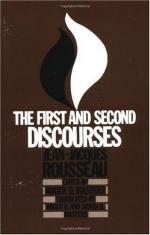|
This section contains 830 words (approx. 3 pages at 400 words per page) |

|
Chapter 4, A Discourse on the Origin of Inequality, Part One Summary and Analysis
Rousseau sees two types of inequality among humans: first, a natural or physical inequality established by nature and another which is moral or political inequality; the latter depends on convention and is established by means of social decisions. Natural inequality's source cannot be uncovered. We cannot relate the two sorts of equality to each other. Instead, the Discourse will focus on moral and political equality. Rousseau aims to see where right to the place of violence and nature came under the law. He wants to know how the strong came to serve the weak.
When imagining the state of nature, we cannot impute to men knowledge of justice. Locke's view will not do. No, the strong oppress the weak and this leads to...
(read more from the Chapter 4, A Discourse on the Origin of Inequality, Part One Summary)
|
This section contains 830 words (approx. 3 pages at 400 words per page) |

|




